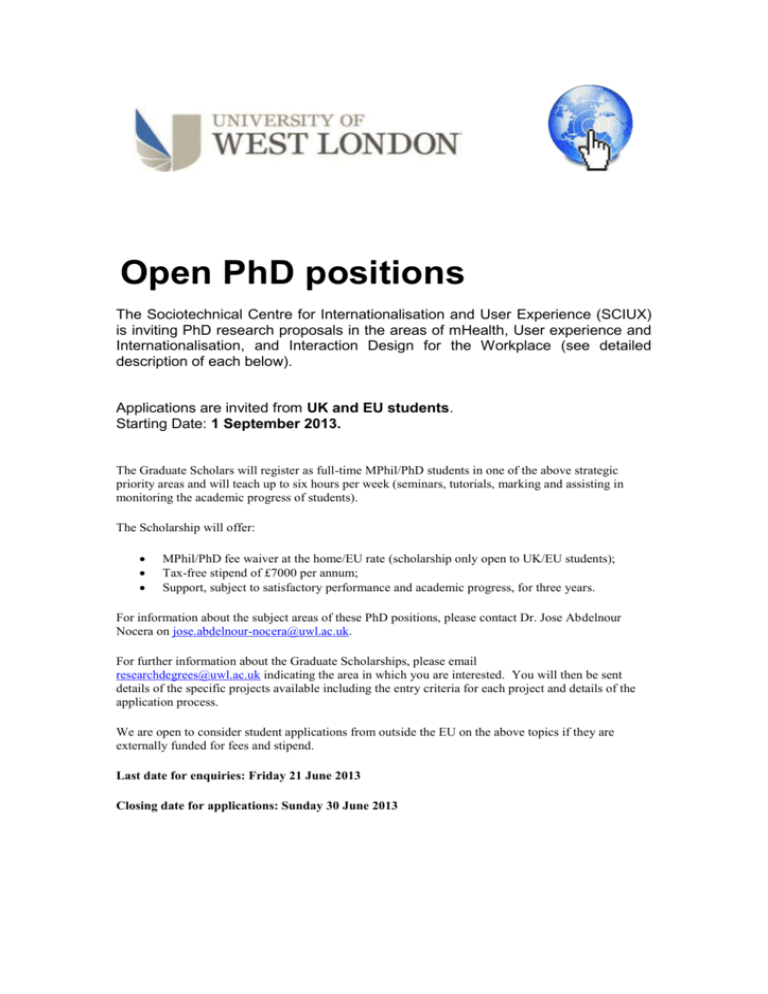Description of Topic Areas and Candidate Profiles
advertisement

Open PhD positions The Sociotechnical Centre for Internationalisation and User Experience (SCIUX) is inviting PhD research proposals in the areas of mHealth, User experience and Internationalisation, and Interaction Design for the Workplace (see detailed description of each below). Applications are invited from UK and EU students. Starting Date: 1 September 2013. The Graduate Scholars will register as full-time MPhil/PhD students in one of the above strategic priority areas and will teach up to six hours per week (seminars, tutorials, marking and assisting in monitoring the academic progress of students). The Scholarship will offer: MPhil/PhD fee waiver at the home/EU rate (scholarship only open to UK/EU students); Tax-free stipend of £7000 per annum; Support, subject to satisfactory performance and academic progress, for three years. For information about the subject areas of these PhD positions, please contact Dr. Jose Abdelnour Nocera on jose.abdelnour-nocera@uwl.ac.uk. For further information about the Graduate Scholarships, please email researchdegrees@uwl.ac.uk indicating the area in which you are interested. You will then be sent details of the specific projects available including the entry criteria for each project and details of the application process. We are open to consider student applications from outside the EU on the above topics if they are externally funded for fees and stipend. Last date for enquiries: Friday 21 June 2013 Closing date for applications: Sunday 30 June 2013 PhD position: Sociotechnical design of mHealth applications in resource-constrained environments Research context This PhD position proposal is framed in the research field of mHealth and is in particular focused on the management of anticoagulation therapy. Coagulation disease is one of the most diffused health issues today and its management requires a continuous communication between patient and doctor. The introduction of mobile devices in anticoagulant therapy practice and management may help in improving the quality of life of patients and support remote doctor-patient communication. In particular, we are interested in the application of such novel applications in resource-constrained environments, typical rural areas in which people do not have direct access to the Internet, from home or from mobile phones. In such settings, the closest medical centre is located in the village and is aimed at serving all the people who leave in that area. Sometimes, the medical centres are provided with Internet connection but its use is strongly restricted to doctors and not always fully available due to technical failures. Research goal The research activity will aim at investigating tools, techniques and methods that can be used by sociotechnical interaction designers and developers of mHealth applications in resource-constrained environments. Candidate profile The ideal candidate should have an MSc or equivalent degree in computer science and combine solid theoretical background and excellent software development skills. Strong commitment to reaching research excellence and achieving assigned objectives is required, so as ability to work in a collaborative and interdisciplinary environment. It is expected that the PhD candidate will carry out applied research work that will start from the establishment of a theoretical framework, continue with the implementation of a software prototype and the experimentation with real data, and conclude with the validation of a proposed solution through a real-life user study. Background knowledge and/or previous experience in the following areas (in order of preference), though not mandatory, will be considered very favourably: - Mobile (Web) design Interaction design Software internationalisation and localization PhD position: HCI should not be WEIRD! Replicating Studies across Countries and Cultures Research context In recent years, researchers in psychology and economics have increasingly called for a consideration of more diverse subject populations. Summarizing contradictory findings between different human populations in various domains such as visual perception or analytic reasoning, Henrich et al. (2010) observed that these research results are not broadly representative. In fact, findings in psychology are almost exclusively based on American undergraduates and other WEIRD (Western, Educated, Industrialized, Rich, and Democratic) subjects. Human-Computer Interaction researchers often build on these findings, thus designing technology that is optimized for WEIRD people. Moreover, a large majority of articles published at prominent HCI venues such as Interact or CHI reports on studies with WEIRD participants, ignoring that these results might not be replicable with other subject populations. Research goal The This PhD project is aimed at tackling two main questions: (1) What are the obstacles faced by user researchers when replicating user studies with more diverse participants (e.g., in other countries and cultures)? (2) What are major HCI principles that are currently being taken for granted, but which are most likely not replicable across different countries and cultures? Candidate profile The ideal candidate should have an MSc or equivalent degree with a strong human-computer interaction component and combine solid theoretical background and prototyping skills. Strong commitment to reaching research excellence and achieving assigned objectives is required, so as ability to work in a collaborative and interdisciplinary environment. It is expected that the PhD candidate will carry out applied research work that will start from the establishment of a theoretical framework, continue with empirical work to explore the research goals and conclude with the validation of a proposed solution through prototype evaluations and user studies. Background knowledge and/or previous experience in the following areas (in order of preference), though not mandatory, will be considered very favourably: - Human-Computer Interaction Social Sciences: Psychology and/or Sociology Software internationalisation and localization PhD position: Interaction Design for the Workplace Research context Human work analysis involves user goals, user requirements, tasks and procedures, human factors, cognitive and physical processes, contexts (organizational, social, cultural). In particular in the HCI and human factors tradition, work is analyzed as end-user tasks performed within a work domain. The focus is on the user's experience of tasks (procedures) and the artefact environment (constraints in the work domain). Hierarchical Task Analysis (Annett & Duncan, 1967) and Work Domain Analysis (Salmon, Jenkins, Stanton, & Walker, 2010) are among the methods that can be used to analyse the goal-directed tasks, and map the work environmental constraints and opportunities for behavior. In addition, there is a strong tradition in HCI for studying work with ethnographic methods (Button & Sharrock, 2009) and from socio-technical perspectives (e.g., Abdelnour-Nocera, Dunckley, & Sharp, 2007). These approaches focus on work as end-user actions performed together with other people in a field setting, that is, the user's experience of using systems are social and organizational experiences. User experience, usability and interaction design are influenced by these approaches and techniques for analyzing and interpreting the human work, which eventually manifests in the design of technological products, systems and applications. recent years, researchers in psychology and economics have increasingly called for a consideration of more diverse subject populations. Research goal This PhD project is aimed at developing a framework for human-work interaction design that reflects recent advances in the pervasive condition of technology and its impact on the trans-mediated nature and experience of today’s workplace, which is now constituted and configured beyond physical boundaries. While any work domain can be used as a focus, we have a preference for work settings related to health, safety critical environments or software engineering teams. Candidate profile The ideal candidate should have an MSc or equivalent degree with a strong human-computer interaction component. Strong commitment to reaching research excellence and achieving assigned objectives is required, so as ability to work in a collaborative and interdisciplinary environment. It is expected that the PhD candidate will carry out applied research work that will start from the establishment of a theoretical framework, continue with workplace studies to explore the research goals and conclude with the validation of a proposed framework of interaction design for the workplace. Background knowledge and/or previous experience in the following areas (in order of preference), though not mandatory, will be considered very favourably: - Human-Computer Interaction Social Sciences: Psychology and/or Sociology







